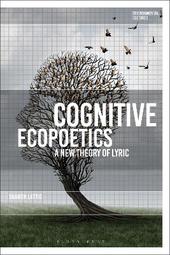
|
Cognitive Ecopoetics: A New Theory of Lyric
Paperback / softback
Main Details
| Title |
Cognitive Ecopoetics: A New Theory of Lyric
|
| Authors and Contributors |
By (author) Dr Sharon Lattig
|
| Series | Environmental Cultures |
|---|
| Physical Properties |
| Format:Paperback / softback | | Pages:248 | | Dimensions(mm): Height 234,Width 156 |
|
| Category/Genre | Literary studies - poetry and poets |
|---|
| ISBN/Barcode |
9781350186132
|
| Classifications | Dewey:808.14 |
|---|
| Audience | | Tertiary Education (US: College) | |
|---|
|
Publishing Details |
| Publisher |
Bloomsbury Publishing PLC
|
| Imprint |
Bloomsbury Academic
|
| Publication Date |
19 May 2022 |
| Publication Country |
United Kingdom
|
Description
New insights from cognitive theory and literary ecocriticism have the power to transform our understanding of one of the most important literary genres: the lyric poem. In Cognitive Ecopoetics, Sharon Lattig brings these two schools of criticism together for the first time to consider the ways in which lyric forms re-enact cognitive processes of the mind and brain. Along the way the book reads anew the long history of the lyric, from Andrew Marvell, through canonical poets such as Samuel Taylor Coleridge, Ralph Waldo Emerson and Emily Dickinson to contemporary writers such as Susan Howe and Charles Olson.
Author Biography
Sharon Lattig teaches at the University of Connecticut, USA.
ReviewsLattig's deeply learned, patiently unfolded, and surprisingly contrary pursuit of a new environmental theory of lyric, as meticulous as it is broad in its historical scope, asks us (whether or not we agree with her conclusions) to reexamine our own assumptions about perception, language, materiality, thought and feeling, as convoked by the transformative and, to use Lattig's word, respeciating occasion of lyric poetry. This is a strong argument for an embodied poetics and for a language in and of the environment, as well as an admirably careful work of cross-disciplinary scholarship, whose convincing readings bring neuroscience and theories of perception and cognition to the riddle of the lyric's persistence. A brilliant, ambitious and thought-provoking defense of poetry. -- Jonathan Skinner, Associate Professor in English, University of Warwick, UK
|